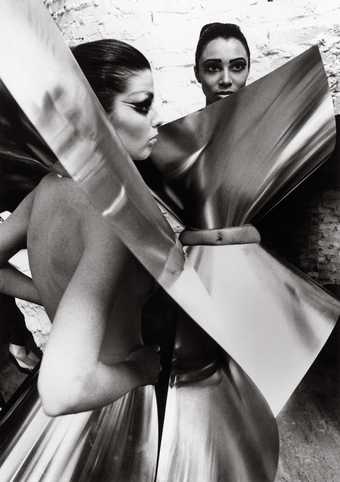
William Klein Who Are You, Polly Maggoo? 1966
Broadway by Light
William Klein, France 1958, 35mm, 12 min
Music: Maurice Le Roux
Source: Walker Art Center
Klein's first film is a dizzying and dazzling study of a night in the life of New York's Great White Way. Focusing on the play of lights and shadows, colours and forms in motion, the camera jumps between the flashing bulbs and neons of Times Square's iconic advertising and the silhouettes of men at work on theatre marquees, as they re-arrange letters on the lightboxes, poised like acrobats on their stepladders. These concrete details are counterbalanced by more impressionistic moments of pure colour, distorted light reflections and severed fragments of words or texts, exemplary of Klein's life-long interest in typography. Illustrative of Klein's transition from photographer to filmmaker, Broadway by Light was declared by Orson Welles to be ‘the first film I've seen in which colour was absolutely necessary.’ Klein was encouraged by his friends Alain Resnais and Chris Marker to make the film, and Marker wrote the brief text that appears onscreen at the beginning of the film.
Who Are You, Polly Maggoo? (Qui êtes-vous, Polly Maggoo?)
William Klein, France1966, 35mm transferred to digiBeta, 105 minSource: ARTE
Acclaimed for being ‘ten years ahead of its time’ by Stanley Kubrick, Who Are You, Polly Maggoo? is Klein’s iconic first fiction film and marks the end of a decade in which he made his name as the most subversive photographer at American Vogue. His scathing satire of Parisian haute couture hinges on Polly Maggoo, a neophyte supermodel from Brooklyn who proclaims, ‘Everything is fashion. Love, ideas, even war. Even politics!’. The audacious production design adds to the film’s delirious glamour as much as it serves to savage a world for which such conceits of style are a primary target. Not unlike Peter Watkins’s Privilege from the following year, Who Are You, Polly Maggoo? targets the co-option and commercialisation of a newly booming youth culture, skewering its freedoms and pretensions as much as the media frenzy which encouraged them. Klein’s pseudovérité twist on the emerging genre of confessional television reveals his uncanny clarity at understanding the fusion of pop and politics that defined the late 1960s.
The screening on Friday 16 November is introduced by Penny Martin, Editor in Chief of The Gentlewoman
